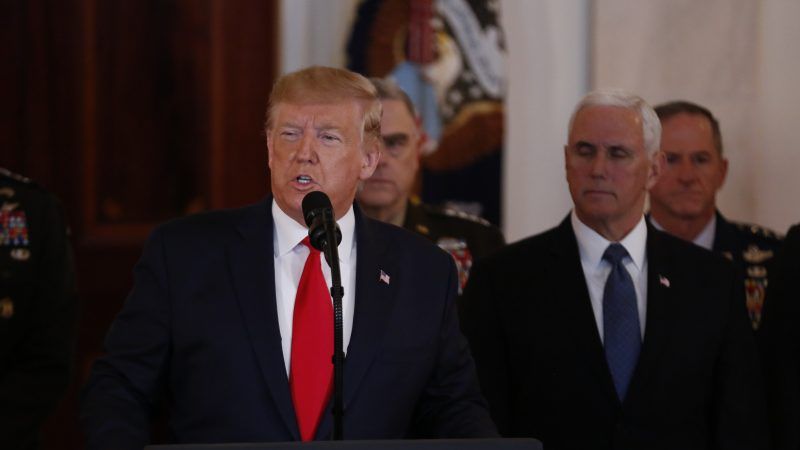Trump's Speech Confirms That Soleimani Strike Didn't Prevent Imminent Attack or Make Americans Safer
But what has the saber-rattling of the past week accomplished for the United States?

In the aftermath of the assassination of Iranian general Qassem Soleimani and an Iranian attack on American military bases in Iraq, President Donald Trump signaled Wednesday morning that he's prepared to step back from the brink of war.
"We want you to have a future, and a great future," Trump said, speaking directly to the Iranian government and the people of Iran. "The United States is ready to embrace peace with all who seek it."
This is unequivocally good news. While Trump did not offer to open direct negotiations with Iran and spoke glowingly about the power of the American military—all while being flanked by uniformed military officials—his Wednesday morning address seems to suggest that the immediate danger of open war has, for now, been reduced ever so slightly. Iran's government has already expressed a desire to avoid further escalation, so you can expect the president's supporters to claim that developments in the past 24 hours vindicate Trump's reckless and unpredictable version of Ronald Reagan's "peace through strength" theory.
But once the threat of war has mostly passed, observers should start asking: What exactly has the saber-rattling of the past week accomplished for the United States?
For starters, it should be obvious by now that the most immediate justification for Soleimani's assassination was either an outright lie or a strategic miscalculation. Killing Soleimani did not prevent an attack on American troops in Iraq; if anything, it appears to have triggered an attack, though thankfully there were no casualties.
It's telling that the White House has already largely dispensed with the notion that the assassination was conducted in order to stop some impending attack. On Wednesday, Trump called Soleimani "the world's top terrorist," and talked up Soleimani's history of organizing and planning militia attacks that have killed and maimed American troops in Iraq over the course of the past decade-plus. As other observers have noted, it's now fairly obvious that Soleimani's killing was about vengeance, not deterrence.
One could argue that killing Soleimani removed a dangerous opponent from the battlefield and that Soleimani's absence will weaken Iran's hand in Iraq, Syria, and elsewhere in the wider Middle East long-term. That's certainly possible—plausible, even—but it probably overstates the extent to which Soleimani was dictating Iran's foreign policy and underestimates the resilience of the Iranian regime. It also ignores the potential dangers of using assassinations as a tool of foreign policy. And it gives the Trump administration credit for a strategic angle that even the administration itself has not publicly claimed. Indeed, the White House has tried to justify killing Soleimani in the present tense ("imminent threat") and past tense (retribution for killing Americans in Iraq), but never in such a hypothetical, future-looking way.
What else has the assassination accomplished? It's given the Iranian regime an even stronger incentive to obtain nuclear weapons as a deterrent against future American aggression. It's exposed, once again, the extent to which Trump has alienated America's allies. It's caused the United States to deploy more troops to the Middle East, thus making any eventual withdraw during Trump's first term even less likely than it already was. And it's given the Iranian government a martyr to use for domestic political purposes in rallying anti-American sentiment.
Yes, Trump's speech on Tuesday has reduced the chance of war with Iran. No, this was not a successful week for U.S. foreign policy, or for the man in charge of it.


Show Comments (405)